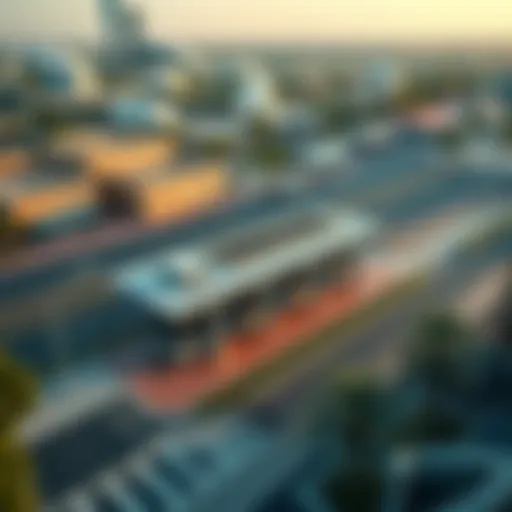Ramadan 2023 Observances and Timings in Dubai
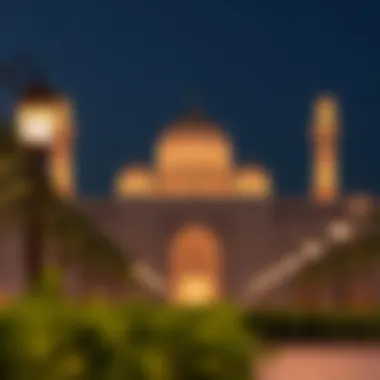

Intro
As the crescent moon heralds the arrival of Ramadan, Dubai immerses itself in a transformative atmosphere, where the essence of reflection, charity, and community unfolds. This holy month, observed by millions around the world, carries unique significance in this bustling emirate, where traditions intertwine with modernity. Understanding the rhythm of Ramadan, particularly its specific timings and cultural observances, becomes paramount for expatriates, investors, and locals alike.
In this guide, we'll explore various facets of Ramadan in Dubai for 2023, shedding light on key prayer and fasting times, cultural nuances, and the implications this sacred month has on the local community and real estate market. For those considering investment opportunities during this period, it is vital to align with the evolving market trends to navigate the property landscape effectively.
As we delve deeper into the realm of Ramadan, expect to encounter informative insights that not only illuminate the spiritual essence of the month but also highlight practical considerations for buyers and investors eager to engage in Dubai's dynamic real estate sector.
With this understanding, we can traverse the crossroads of spirituality and investment, ensuring that Ramadan's profound significance resonates through the fabric of life in Dubai.
Prelude to Ramadan in Dubai
Ramadan holds a special place in the hearts of millions around the world, and particularly in Dubai, where the confluence of cultures meets a rich Islamic tradition. This holy month of fasting is not just a personal obligation for Muslims but transforms the entire ambiance of the city, creating a unique atmosphere that blends spirituality with community, culture, and charity. Understanding Ramadan is essential for anyone looking to engage meaningfully within Dubai’s multifaceted social fabric—especially for investors and expatriates exploring business opportunities during this time.
Significance of Ramadan
At its core, Ramadan is about reflection and devotion. It’s a time when Muslims engage in fasting from dawn until sunset, which is a practice aimed at fostering discipline, self-control, and connection to those less fortunate. Fasting is often accompanied by increased prayers and reading from the Qur'an, heightening its spiritual significance. It’s not merely a ritual but a profound expression of faith that resonates deeply within the community.
Moreover, Ramadan plays a pivotal role in enhancing communal ties. Families gather to break their fast, known as Iftar, creating an opportunity for sharing meals and stories. These traditions reinforce relationships, as everyone—from neighbors to distant relatives—comes together in celebration, outweighing the daily grind of life. This atmosphere is something that those new to Dubai or even long-time residents should take the time to appreciate.
Outsiders observing the month may find the transformed landscape compelling. Businesses adapt to the schedule, and special events pop up throughout the city, all contributing to a vibrant, collective experience.
Ramadan as a Unifying Experience
In Dubai, Ramadan transcends individual observance, morphing into a collective experience that brings communities together, regardless of background or faith. The city’s diverse populace engages in various ways, from participating in public Iftar gatherings to donating to charitable causes, emphasizing the shared spirit of generosity.
"Ramadan transcends the individual; it's a bridge connecting different cultures in a stunning display of unity."
Non-Muslims living or visiting Dubai are encouraged to partake in this spirit. Engagement in public events and awareness of local customs can enhance their understanding and appreciation of the significance behind the fasting and prayer, ultimately fostering respect and harmony among communities. This intermingling of traditions creates a rich tapestry that is emblematic of Dubai itself—a dynamic intersection of the old and the new, the spiritual and the celebratory.
Thus, for businesses, the month of Ramadan presents not only challenges but also a significant opportunity. Companies often tailor their marketing strategies to align with the values and sentiments of the period, appealing to the higher sense of community and compassion that flows so freely during this time. Recognizing and capitalizing on these moments can lead to fruitful interactions and long-term relationships between businesses and the community at large.
Ramadan Dates and Timing
Understanding the dates and timing of Ramadan 2023 is crucial for anyone residing in Dubai or planning to engage with the community during this significant month. Ramadan, a month of fasting, spiritual reflection, and community engagement, is observed by Muslims around the globe. In Dubai, its timing affects various aspects of daily life, from business hours to prayer schedules. As investors or expatriates in the region, being aware of these factors can provide an advantage, helping you navigate the cultural and social landscape effectively.
Start and End Dates
Ramadan in 2023 is expected to commence on the evening of March 22 and conclude on April 20, marking an umbrella of 30 days filled with a distinctive rhythm. These dates are determined based on lunar sightings, which give each year a slightly different timeframe. It’s important to note these dates can still shift based on the actual sighting of the moon, aligning with religious traditions and beliefs.
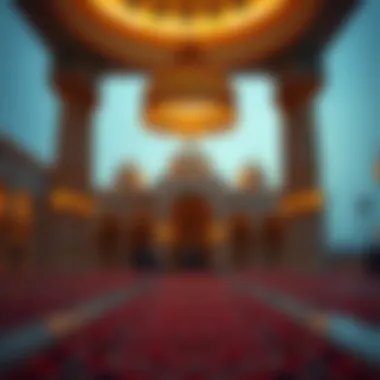

Families and communities often prepare weeks in advance for this month, planning for personal fasting and community congregations. For local businesses and investors, knowing these dates can assist in making strategic decisions. Events and promotions need to align with the fasting hours, and adjusting operations accordingly helps in minimizing disruptions.
Fajr and Maghrib Prayer Times
During Ramadan, daily schedules pivot around specific prayer times, primarily Fajr and Maghrib. Fajr, which marks the pre-dawn prayer, will fall at approximately 4:54 AM during this month, signaling the start of the fast. This time can vary slightly depending on the region, so staying updated with local mosques or Islamic centers is advisable.
Maghrib, celebrated at sunset, will occur around 6:34 PM, allowing families to break their fast. The first sip of water and bite of dates is often a cherished tradition, symbolizing a moment of gratitude and togetherness. This schedule influences myriad daily activities. Restaurants adjust their opening times to cater to iftar meals, while businesses might modify their hours, emphasizing the importance of understanding this rhythm.
"Timing is everything, especially when it comes to Ramadan. Knowing when to fast and when to break can profoundly impact one's experience."
Eid al-Fitr Observances
The end of Ramadan is celebrated with Eid al-Fitr, which is anticipated to begin on April 21 in 2023, although this is also reliant on lunar sightings. Eid al-Fitr is a day of festivity marked with special prayers, family gatherings, and charitable giving. It’s customary for many to wear new clothes, exchange gifts, and partake in communal meals. The significance of Eid can’t be overstated, as it symbolizes both the conclusion of the month of fasting and a time for community building.
Local businesses often see an increase in activity as people prepare for celebrations. The real estate market might also feel the effects, as some individuals look for spacious venues to accommodate family gatherings. Honoring the local customs during this time helps forge stronger ties with both the community and potential business partners.
In revisiting these dates and times, it's clear they shape the experience of Ramadan in Dubai profoundly, impacting both personal and community practices. Being cognizant of these elements facilitates smoother interactions and a deeper understanding of the local culture.
Cultural Practices During Ramadan
Cultural practices during Ramadan serve as the heartbeat of the month, intertwining religious observances with social engagements. In Dubai, a melting pot of cultures, the month of Ramadan is not just a time for fasting; it encapsulates rich traditions that unite communities and promote understanding. These practices foster a sense of belonging, significantly benefiting not just the Muslim populace but the wider community, including expatriates and visitors. As Ramadan progresses, the warmth of sharing meals and participating in rituals become a bridge that connects diverse peoples.
Iftar Traditions
Iftar, the evening meal to break the fast, stands out as one of the most cherished traditions in Ramadan. The event begins with the call to Maghrib prayer, signaling the end of a long day of fasting. Communities come alive at sunset, with families and friends gathering to share iftar meals that often extend beyond their immediate households.
Common Elements of Iftar:
- Date and Water: The first sip usually consists of dates and water, a tradition rooted in the practices of the Prophet Muhammad. This initial nourishment breaks the fast gently, preparing the body for a hearty meal.
- Culinary Diversity: From shawarma to biryani, every table is a showcase of food from various cultures, reflecting the emirate's international population. Restaurants often roll out special menus catering to iftar, enticing diners with traditional and contemporary cuisines.
- Community Iftars: Public iftar events are frequently hosted, particularly by mosques and community centers. These gatherings not only strengthen communal ties but also extend hospitality towards non-Muslim residents, inviting them to join in the ritual of breaking bread together.
Charity and Community Support
Charity holds significant weight during Ramadan, viewed not only as an obligation but as an opportunity to show compassion to those less fortunate. The act of giving, or Zakat, is emphasized, with many opting to provide financial aid or food items to the needy.
This month underscores various initiatives promoting social responsibility. Many organizations set up food drives and distribute meals to laborers and underserved communities. It’s common to see donation boxes at shopping malls or community hubs, encouraging people to contribute.
Moreover, several local businesses join hands to support these initiatives, enhancing their brand's community significance while providing vital assistance, thus intertwining economic vitality with altruism.
"Ramadan is a reminder that our humanity is measured by our care for one another."
Nightly Prayers and Events
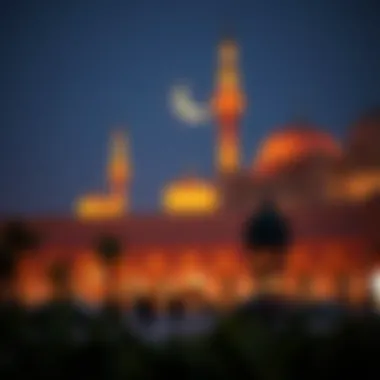

The special nightly prayers, or Tarawih, add to the ambiance of Ramadan, facilitating deeper engagement with faith. Mosques brim with congregants gathering after the iftar, collectively focusing on prayer and reflection. These prayers often extend late into the night, with many opting to observe additional prayers called Tahajjud.
Various mosques also host special lectures, Quran recitations, or talks that address pertinent themes such as community cohesion and the essence of faith. Events during Ramadan also include activities such as cultural exhibitions showcasing Islamic art, talks on social issues, and even movie nights focused on inspirational themes.
Business and Economic Considerations
The Ramadan month brings a unique rhythm to life in Dubai, significantly impacting various sectors, from local businesses to the broader economic environment. Understanding these influences is crucial for investors and expatriates looking to navigate the nuances of this transformative period. As Dubai embraces the spirit of unity and reflection during Ramadan, businesses must adjust to the shifts in consumer behavior and preferences.
Impact on Local Businesses
For many local businesses, Ramadan is more than just a month of fasting; it's a golden opportunity for growth. Retailers often see a spike in sales, particularly toward the end of the month as families prepare for Eid al-Fitr celebrations. Restaurants may operate on a different schedule, opening later for Iftar, and often providing special menus for breaking the fast.
- Increased Sales Opportunities: Many retailers introduce discounts and special offers. This strategy attracts customers looking for gifts or festive items to share with their community.
- Community Engagement: Local businesses often participate in charitable events during Ramadan. These initiatives can enhance brand image and foster customer loyalty, which is essential for long-term success.
The month cultivates a sense of community, and businesses tapping into this spirit can generate positive goodwill, often resulting in increased sales during the holy month.
Real Estate Market Dynamics
The real estate market in Dubai experiences distinct dynamics during Ramadan. While some might assume that a spiritual month would halt transactions, that's not necessarily the case. Investors and buyers often use this period to reflect on their options, leading to increased activity.
- Shifting Buying Patterns: Many families consider purchasing homes during Ramadan, especially with a focus on community living which aligns with the month's values. This translates into heightened demand for family-oriented developments and residential projects.
- Flexible Showings: Real estate agents often adapt their schedule to accommodate potential buyers, conducting property viewings during the evening and early mornings, aligning with the community's routines.
This shift in buyer behavior underscores the importance of understanding seasonal rhythms in the real estate market. Observers note that properties with good access to mosques and communal spaces tend to be favored during Ramadan.
Investment Opportunities During Ramadan
Investment opportunities often arise during Ramadan, as both short- and long-term strategies can align with the unique demands of the month. Investors keen on capitalizing on this period can find several paths to explore.
- Commercial Real Estate: Investing in commercial properties that cater to retail and dining can yield high returns, especially with the uptick in foot traffic during the evenings.
- Short-term Rentals: With many expatriates returning to Dubai during Ramadan and Eid, the brief window for short-term rentals offers a lucrative opportunity for property owners.
- Startups and Initiatives: Innovations catering to Ramadan-related services—from food delivery options during Iftar to online shopping platforms that facilitate convenience—can attract significant investment.
Ramadan's unique essence creates a fertile ground for businesses that can adapt to its rhythm. As an investor or buyer, recognizing these opportunities in context could be the key to successful navigation in Dubai's vibrant market during this holy month.
Importantly, successful businesses will be those that prioritize community connection, understanding not just the economic potential, but also the cultural significance underlying all transactions during this sacred time.
For further insights into economic strategies during Ramadan, you might want to visit resources like Investopedia or Dubai Economy. From there, those interested can explore the innovative approaches that local businesses take during this season.
Navigating Daily Life in Dubai During Ramadan
Ramadan in Dubai brings a unique rhythm to the city, presenting both challenges and opportunities for residents and visitors alike, especially for non-Muslims. Understanding the intricacies of daily life during this month can enhance one’s experience and foster respect for local customs. The observance impacts schedules, social interactions, and even dining options, which makes it crucial for everyone, particularly expatriates and investors looking to engage with the community, to adapt to these changes.
Adjustments for Non-Muslim Residents
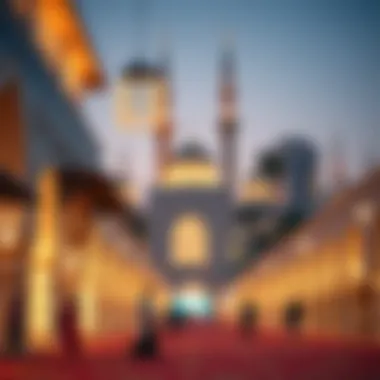

For non-Muslim residents in Dubai, adapting to the customs and practices of Ramadan is essential for harmonious living. One of the most notable adjustments is public conduct during daylight hours. Eating, drinking, or smoking in public can be viewed as disrespectful to those who are fasting. Therefore, it is advisable to be mindful of the feelings of the Muslim community and to preserve their sanctity during these fasting hours.
Moreover, many workplaces implement flexible timings, allowing employees to come in later or leave earlier to accommodate fasting schedules and evening prayers. This can create an unusual but refreshing work atmosphere, where employees share in the celebrations and reflections of the month.
It’s important for non-Muslims to respect local traditions. Being considerate can foster goodwill and strengthen community bonds.
Dining and Entertainment Guidelines
Dining options during Ramadan undergo significant changes. While many restaurants adjust their hours and some may not serve food at all until after sunset, others open with special Iftar menus, offering a delightful experience for those breaking their fast. Non-Muslims often find it enriching to join these meals, which showcase traditional dishes like dates and Arabic coffee, enhancing cultural understanding.
In terms of entertainment, the atmosphere in Dubai can become more subdued during daylight, with many events scheduled for after iftar. It’s a good idea to check local listings and social media platforms like Facebook and Reddit for updates on Ramadan events. Shopping malls, however, remain open and lively, often featuring extended hours and special promotions.
Some tips for non-Muslims include:
- Plan meals ahead: Enjoy Iftar at communal events or home gatherings to experience the essence of Ramadan together.
- Be discreet: If dining during the day, consider your location to avoid offending those who are fasting.
- Explore Ramadan activities: Check out cultural events that embrace the spirit of the month.
Transportation and Activity Scheduling
Transportation in Dubai can see shifts in patterns during Ramadan. With many people finishing work earlier, traffic congestion may ease up on main routes just before iftar and increase again as crowds head to family gatherings or restaurants. Keeping an eye on traffic reports and allowing for extra travel time is wise.
Also, public transport may run on adjusted schedules to accommodate the later working hours. For those relying on taxis, particularly apps like Careem or Uber, anticipate longer wait times during iftar.
Regarding activity scheduling, planning day trips or excursions requires some consideration. Activities traditionally involving food or public gatherings should be saved for the evening hours. Many are surprised to find that Dubai’s nightlife features vibrant venues that come alive after dark, offering a medley of entertainment ranging from concerts to cultural showcases.
In summary, navigating daily life in Dubai during Ramadan requires a blend of adaptability and cultural sensitivity. Through understanding and respecting local customs, non-Muslim residents can enhance their experience while also contributing to a respectful and harmonious environment.
End: Embracing the Spirit of Ramadan in Dubai
As we draw the curtains on our discussion of Ramadan in Dubai, it's essential to recognize how deeply embedded this month is in the fabric of the city's culture and social life. Ramadan is not just about fasting or religious duty; it serves as a powerful reminder of community, unity, and charity. In Dubai, a city known for its opulence, this month brings a stark yet refreshing contrast, emphasizing humility and connection among its residents.
Reflection on Faith and Community
During Ramadan, individuals reflect on their faith and the principles that drive their actions every day. From early morning until sunset, the fast serves as a practice of self-discipline and spiritual rejuvenation. The magnetic pull of communal prayers, especially during the Taraweeh nights, showcases the power of collective faith. It’s in these serene moments, with rows of worshippers joining in harmony, where one can sense the profound bond shared among community members.
Moreover, charity takes center stage during this month. Various organizations and individuals engage in acts of giving, not just to fulfill a religious obligation but also as a means to uplift the less fortunate within the community. The generosity of the Emirati people is reflected in countless initiatives, from distributing Iftar meals to hosting fundraisers. This spirit of giving deepens connections, bridging cultural divides and inviting everyone—Muslim and non-Muslim—to partake in the essence of Ramadan.
Looking Ahead to Future Ramadans
Ramadan is a period of reflection, but it also stirs aspirations for future endeavors. Each year brings new opportunities both personally and economically. Investors and expatriates can look towards future Ramadans to assess trends, gauge market dynamics, and align their interests with the city's evolving landscape.
For businesses, understanding the rhythm of Ramadan can foster unique marketing strategies that resonate with the community. As Dubai continues to expand and diversify, there is a growing need for new initiatives that cater to the sentiment of the holy month. By embracing the spirit of Ramadan now, businesses can position themselves favorably for years to come.
For residents and expatriates, making plans for future Ramadans means considering how to engage more deeply with the community. Perhaps it translates to hosting charity events or increasing participation in communal Eid celebrations. The lasting impact of this month doesn’t just culminate in the three-day festival at the end; its essence carries forward, enriching the lives of all who experience it.
Ultimately, as Dubai embraces the spirit of Ramadan, every individual has the chance to find their own place within this beautiful tapestry. Whether through faith, community involvement, or economic engagement, the lessons learned and connections forged this Ramadan will ideally leave a lasting imprint on the hearts of all residents and visitors alike.
"Ramadan is not just a month of fasting; it's a journey of the soul, a time for reflection and making deeper connections with those around us."



